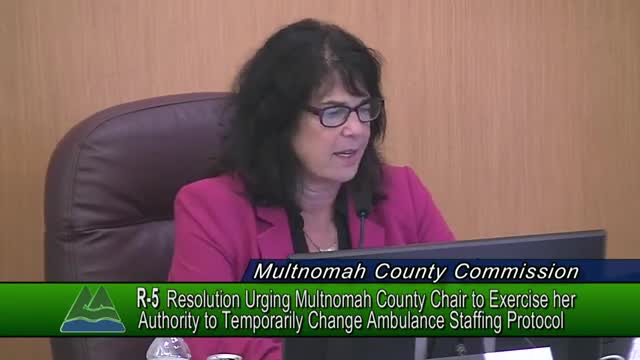County leaders clash over ambulance response time crisis
July 26, 2024 | Multnomah County, Oregon

This article was created by AI summarizing key points discussed. AI makes mistakes, so for full details and context, please refer to the video of the full meeting. Please report any errors so we can fix them. Report an error »

Concerns over ambulance response times and transparency dominated the Multnomah County Regular Meeting on July 25, 2024, as commissioners grappled with recommendations from the county ombudsperson regarding emergency medical services (EMS). The meeting revealed deep frustrations among board members about the lack of an EMS advisory council, which has been absent for over a year and a half, hindering oversight and accountability in the system.
Commissioner Myron expressed discontent with the current state of affairs, highlighting the detrimental impact on first responders and the community. "It just feels like everything's behind closed doors," she stated, emphasizing the urgent need for more ambulances on the streets. Her comments underscored a broader sentiment that the county's failure to comply with existing codes has left the community vulnerable.
A proposed amendment aimed at incorporating the ombudsperson's recommendations into a resolution was met with resistance. The amendment sought to ensure regular data reporting on ambulance response times and to establish the long-awaited EMS advisory council. However, it ultimately failed to pass, with several commissioners voicing concerns about the necessity and implications of the changes.
The discussion also touched on the contentious issue of fines for noncompliance with ambulance service standards. Some commissioners argued that imposing fines could be counterproductive, suggesting that funds could be better utilized to enhance EMS capabilities rather than penalizing the service provider, AMR.
As the meeting concluded, Chair Vega Peterson acknowledged the complexity of the EMS situation and reiterated the commitment to improving response times and accountability. "My priority is to keep the community safe and healthy," she affirmed, signaling that further discussions and proposals would be forthcoming in the following week.
The ongoing debate reflects a critical moment for Multnomah County's emergency services, as leaders seek to balance compliance, community safety, and the operational realities faced by first responders. The outcome of these discussions will be pivotal in shaping the future of EMS in the region.
Commissioner Myron expressed discontent with the current state of affairs, highlighting the detrimental impact on first responders and the community. "It just feels like everything's behind closed doors," she stated, emphasizing the urgent need for more ambulances on the streets. Her comments underscored a broader sentiment that the county's failure to comply with existing codes has left the community vulnerable.
A proposed amendment aimed at incorporating the ombudsperson's recommendations into a resolution was met with resistance. The amendment sought to ensure regular data reporting on ambulance response times and to establish the long-awaited EMS advisory council. However, it ultimately failed to pass, with several commissioners voicing concerns about the necessity and implications of the changes.
The discussion also touched on the contentious issue of fines for noncompliance with ambulance service standards. Some commissioners argued that imposing fines could be counterproductive, suggesting that funds could be better utilized to enhance EMS capabilities rather than penalizing the service provider, AMR.
As the meeting concluded, Chair Vega Peterson acknowledged the complexity of the EMS situation and reiterated the commitment to improving response times and accountability. "My priority is to keep the community safe and healthy," she affirmed, signaling that further discussions and proposals would be forthcoming in the following week.
The ongoing debate reflects a critical moment for Multnomah County's emergency services, as leaders seek to balance compliance, community safety, and the operational realities faced by first responders. The outcome of these discussions will be pivotal in shaping the future of EMS in the region.
View full meeting
This article is based on a recent meeting—watch the full video and explore the complete transcript for deeper insights into the discussion.
View full meeting
